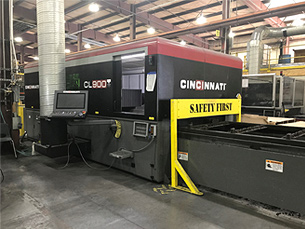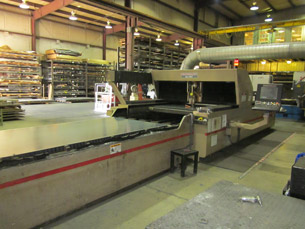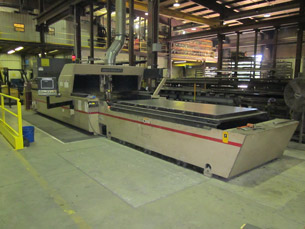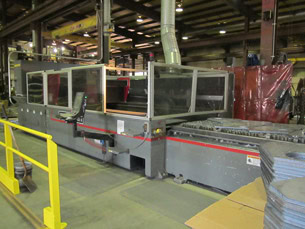Process Development & Fabrication, Inc. is a preeminent provider of metal fabrication services for customers around the world. We use the latest technology to provide quality precision products with the utmost speed and efficiency. Our 100,000 square foot facility includes robotic welding, CNC forming and machining, metal shearing, automatic sawing, and laser cutting. Our extensive selection of cutting tables allow us to provide superior laser cutting services to meet even the most complex and stringent specifications.
PDF, Inc. features 7 laser tables that offer a broad range of laser parameters, giving us the ability to cut various parts without the use of extra tooling. By cutting holes or etching parts, we can ensure that you will have precision parts quickly and cost-effectively. With 7 laser stations, we can handle small projects or large production runs with ease while still maintaining customer satisfaction.




We also provide turnkey start-to-finish component production. Our experts will help you complete your project swiftly and accurately from initial design and engineering through production and finishing. We offer custom prototyping services, so the product meets your needs before production begins. Our comprehensive and extensive facilities allow us to provide one-stop shop services for everything from sample runs to large-scale production volumes.
Laser cutting is a highly versatile fabrication process that uses a precision laser to cut shapes from a material based on pre-programmed computerized specifications. Product designs are typically programmed using a CAD program. There are three types of lasers typically used in laser cutting: CO2, Nd, and Nd-YAG. CO2 cutting uses a tube filled with CO2, hydrogen, and nitrogen gas and mirrors to produce a laser beam. Nd and Nd-YAG methods, on the other hand, use a series of diodes to create the beam.
Although the beam source may differ depending on the type of cutter you are using, each method uses the same basic cutting operation.
The strength, speed, and width of the beam are all adjusted based on the material type, material thickness, and design requirements. Laser cutting is particularly useful for precision components, as the computer-controlled beam can cut within extremely tight tolerances.
Laser cutting offers numerous advantages over other cutting methods such as plasma cutting, CNC machining, and waterjet cutting. Lasers can be relied upon to cut many different materials with superior accuracy, speed, and economy with minimal distortion.
Laser beams are extremely powerful and can be narrowed to produce extremely detailed components within exceptionally tight tolerances. The extreme accuracy of laser cutting makes it ideal for the creation of precision components for critical applications in aerospace, electronic, and industrial applications where accuracy is paramount.
Laser cutting is an extremely fast and economical process, even when used for small-scale production. Since laser cutting uses software to create pre-programmed patterns, it is not necessary to pre-cut tools such as dies in advance. There is also no wear and tear on cutting tools, because there is no physical contact between the cutter and the surface of the material. When compared with traditional tooling methods, laser cutting takes less time, uses fewer resources, and requires significantly less maintenance and repair work. These benefits allow for faster turnaround, higher production, and reduced time and labor for a much more economical process.
Although laser cutting uses heat to cut materials, it is easy to modulate speed and intensity to prevent warping and distortion, especially for thin materials. Laser cutting can be problematic for extremely thick materials, as the amount of heat necessary to cut through the material can cause some distortion. However, the heat-affected zone is quite small, and any distortion can easily be machined out.
Laser cutters can be used to cut or engrave a variety of metals, including stainless steel and aluminum. It is often used to cut non-metal materials such as wood, polymers, and textiles. Although laser cutters exhibit a high level of versatility, they are not recommended for extremely thick metals.
At PDF, Inc., we pride ourselves on providing superior metal fabrication services to meet your every need. In addition to our extensive range of laser cutting services, we offer metal parts manufacturing services, including metal forming, CNC punching, shearing, sawing, and welding. We also offer finishing services, including media blasting, powder coating, and assembly. To learn how PDF can streamline your next project, contact our experts today.